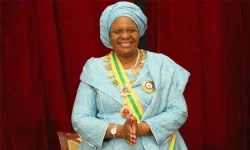Namibia's president, Netumbo Nandi-Ndaitwah, boldly declared that her country can handle its health programs without US support. Speaking to Al Jazeera, she explained that Namibia has developed enough skills to continue critical work despite potential aid cuts from the United States. Her team has made impressive progress battling HIV-AIDS and won't let funding challenges stop their momentum.
The Trump administration announced massive cuts affecting healthcare and development projects worldwide. Namibia received roughly 40 million US dollars last year for HIV programs. USAID helped position Namibia as a standout country in reducing mother-to-child HIV transmission. In 2024, the World Health Organization recognized Namibia's achievements with a silver tier award for eliminating vertical transmission.
Nandi-Ndaitwah emphasized that the skills learned through US government support will enable Namibia to maintain its healthcare initiatives. She acknowledged potential concerns about rising HIV cases but remained confident about controlling the epidemic. The president highlighted Trump's congratulatory messages after her inauguration and appreciated diplomatic gestures of goodwill.
Despite frozen aid, Namibia plans to maintain strong relationships with the United States. The countries share mutual interests across education, health, and mineral resources. Years of bilateral agreements provide a foundation for continued cooperation. Nandi-Ndaitwah advocated for peaceful international dialogue as her nation's successful approach since independence.
Addressing recent US tariffs that increased global tensions, the president remained committed to diplomatic solutions. A 21% tariff on Namibian goods could create challenges, but she emphasized advocating for constructive discussions. Her ultimate goal centers on strengthening global cooperation and ensuring Namibian citizens can benefit from national resources and international partnerships.
The Trump administration announced massive cuts affecting healthcare and development projects worldwide. Namibia received roughly 40 million US dollars last year for HIV programs. USAID helped position Namibia as a standout country in reducing mother-to-child HIV transmission. In 2024, the World Health Organization recognized Namibia's achievements with a silver tier award for eliminating vertical transmission.
Nandi-Ndaitwah emphasized that the skills learned through US government support will enable Namibia to maintain its healthcare initiatives. She acknowledged potential concerns about rising HIV cases but remained confident about controlling the epidemic. The president highlighted Trump's congratulatory messages after her inauguration and appreciated diplomatic gestures of goodwill.
Despite frozen aid, Namibia plans to maintain strong relationships with the United States. The countries share mutual interests across education, health, and mineral resources. Years of bilateral agreements provide a foundation for continued cooperation. Nandi-Ndaitwah advocated for peaceful international dialogue as her nation's successful approach since independence.
Addressing recent US tariffs that increased global tensions, the president remained committed to diplomatic solutions. A 21% tariff on Namibian goods could create challenges, but she emphasized advocating for constructive discussions. Her ultimate goal centers on strengthening global cooperation and ensuring Namibian citizens can benefit from national resources and international partnerships.












